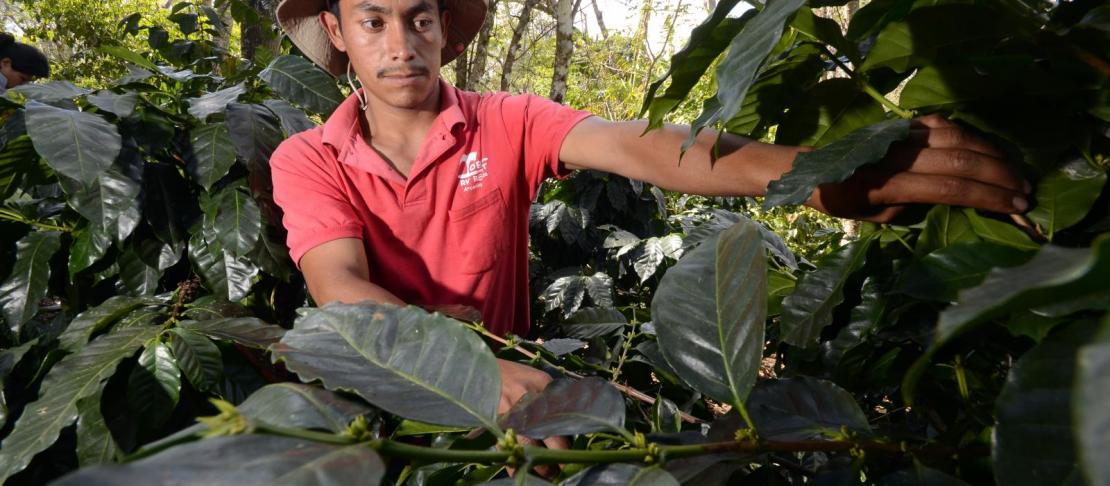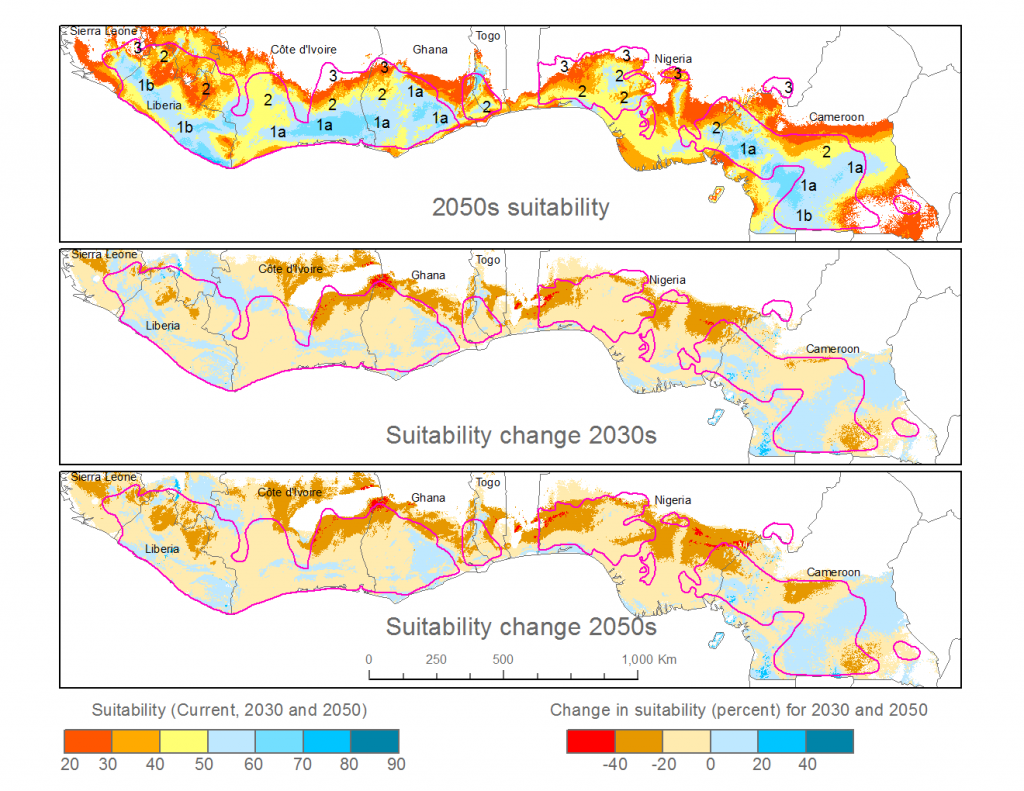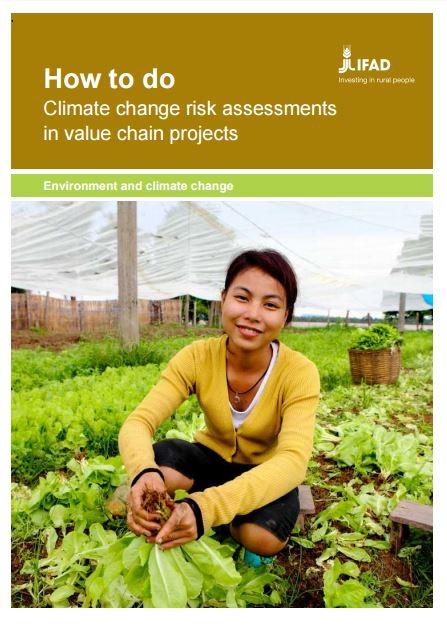Climate-smart value chains in smallholder agriculture: getting started

A recent learning event discussed knowledge-based approaches to develop value chains programs that address climate risks.
Farmers have dealt with climate risks throughout the history of agriculture. Climate change is now increasing the intensity, frequency and variety of those risks. These risks threaten the long-term benefits of agricultural value chain projects, which are often designed to reduce poverty and improve livelihoods of smallholder farmers. This is why CCAFS has partnered with the International Fund for Agricultural Development (IFAD), a specialised UN agency and international financial institution which addresses rural poverty in developing countries. Well over 50 percent of all projects supported by IFAD have a value chain component, which could be affected by climate change risks, threatening the anticipated development outcomes from these investments.
Approaches to transition to climate-smart value chains were the focus of discussions at a learning event which IFAD and CCAFS co-organized on 25 February 2016 in Rome. IFAD attendees indicated that in their work they are trying to maximise the economic benefits of value chains to smallholders facing rapid environmental change. Thus they need tools, tactics and approaches to manage climate risks and opportunities at the design and implementation phases of value chain investment projects. A key conclusion of the learning event was that building in-country capacity to use relevant tools for real decisions is even more important than building the tools.
Resources to manage climate risks and opportunities in value chains
As part of the partnership with IFAD, CCAFS has developed guidance and tools to make IFAD’s value chain investments ‘climate-smart’. The 'How To Do Note (HTDN) on climate change risk assessments in value chain projects' provides a simple 5 step process to design climate-smart value chains. These steps are:
- Selection of the value chain
- Identification of key climate risks in the value chain
- Choice of the most effective climate interventions
- Targeting those most vulnerable to climate risk
- Reaching scale with climate interventions
Knowledge inputs are needed at each of these steps. To address these knowledge needs, CCAFS is developing a range of tools which can support implementers. These are further explained in the info note, ‘How can we develop value chain programs that address climate risks?’
Knowledge-based approaches to value chain development in practice
Knowledge-based approaches to climate-smart value chain design is already underway in several IFAD projects in partnership with CCAFS and various CGIAR centres. Dr Peter Läderach, Senior Climate Change Specialist at the International Center for Tropical Agriculture (CIAT), highlighted CIAT’s work supporting various projects under IFAD’s Adaptation for Smallholder Agriculture Programme (ASAP). These included:
- Nicaragua: Adapting to Markets and Climate Change project focuses on coffee and cocoa value chains.
- Liberia: Tree Crops Extension project focuses on coffee, cocoa, oil palm and rubber value chains.
- Uganda: Project for the Restoration of Livelihoods in the Northern Region focuses on food security, market access, value added and infrastructure.
- Comoros: Focus on climate-smart agriculture practices, extension and water storage for agriculture.
- Viet Nam: The project for adaptation to climate change in the Mekong Delta in Ben Tre and Tra Vinh provinces focus on climate change knowledge and finance
Knowledge inputs in the design and implementation phases provide decision makers with the evidence to make investments. For example, CIAT’s work in the West African cocoa belt projects the impact of climate change on suitability to grow cocoa in major growing areas. These projections allow decision makers to select suitable interventions.

Based on changes to suitability, CIAT researchers are also identifying zones where incremental, systemic, and transformational adaptation interventions are needed. A new project led by CIAT under the IFAD-CCAFS learning alliance is going a step further, to analyse the costs and benefits of proposed interventions.
Reaching scale with knowledge-based approaches to value chain development
The IFAD-CCAFS partnership showcases the role that science can play in addressing the needs of decision makers as they develop climate-smart value chains. However, such good practice needs to be scaled out across investment decisions to achieve scale. Efforts to scale up are being seen in the private sector. Climate change adaptation measures are being built into existing voluntary certification in coffee and cocoa value chains, allowing rapid scaling up to 30% of global cocoa producers and 15% of global coffee producers, with an initial focus on Ghana, Nicaragua and Peru. Similar approaches of mainstreaming climate change adaptation measures in public sector investments in value chain development should be a priority.
Presentations from event:
- Good design in theory: IFAD’s How To Do Note on Climate Risks in Value Chains
- 7 solutions in 7 minutes: presentation of key CGIAR resources and capacities of potential value to IFAD programming
- Assessing and responding to vulnerability in value chains: rapid methods for communities and commodities
- Prioritising adaptation actions in value chains: what we know about best bets for costs, benefits and co-benefits
Further reading:
- Dinesh D, Vermeulen SJ, Läderach P, Mwongera C. 2016. How can we develop value chain programs that address climate risks? CCAFS Info Note. Copenhagen, Denmark: CGIAR Research Program on Climate Change, Agriculture and Food Security (CCAFS).
- Schroth G, Läderach P, Martinez-Valle AI, Bunn C. 2016. From site-level to regional adaptation planning for tropical commodities: cocoa in West Africa. Mitig Adapt Strateg Glob Change. Forthcoming.
- Vermeulen SJ. 2015. Climate change risk assessments in value chain projects. Rome, Italy: International Fund for Agricultural Development (IFAD).
Sonja Vermeulen is the Head of Research at CCAFS. Dhanush Dinesh is the Global Policy Engagement Manager at CCAFS.

